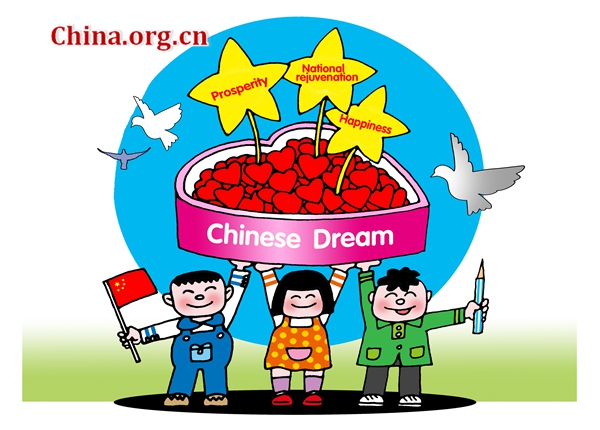Two dreams: Chinese and American visions in 2017
- By Kerry Brown and Lili Zhao
 0 Comment(s)
0 Comment(s) Print
Print E-mail China.org.cn, February 12, 2017
E-mail China.org.cn, February 12, 2017
|
|
|
Chinese Dream [By Gu Peili / China.org.cn] |
Xi Jinping was the first president of China to attend the annual World Economic Summit in Davos, Switzerland, last January. That, in itself, is headline news. However, it's more meaningful to examine not only what he said or the recipients of the message, but how it impacts on the current uncertain geopolitical environment.
The highlight was his championing of the merits of globalization at a time when this being deeply contested elsewhere in the world. It's obvious he was trying to map out some idea of what a Chinese vision of common global destiny might be.
Xi differs from past Chinese leaders. His tone is more expressive, and he attempts to be more communicative and outgoing, using almost homely language.
What Xi didn't explicitly do, perhaps surprisingly, was to use the phrase "Chinese Dream," a slogan promoted under his leadership, although it was there, implicitly, providing a juxtaposition with Donald Trump's intention to "Make American Great Again."
As leaders of the two most powerful countries in the world, they could not be more different on political and economic issues with one exception - they both value dreaming.
People, a word both mention repeatedly, are the crux of this shared vision to inspire people to unite and march forward to restore the greatness of their respective countries.
That, however, raises the question: what do the dreams really mean? While "Make American Great Again" is all about America coming first, the Chinese dream needs more definition. As Jeffrey Wasserstrom, author and China scholar, has commented, "Xi's Chinese Dream is protean. He associates it with different things at different times in different places. At its core, though, is national rejuvenation."
Xi's Chinese dream contains many facets. It is the dream of people's happiness, for instance, or the dream of national prosperity, the dream of peaceful and sustainable development, the dreams of the young generation, the dream of the "belt and road" as a link to connect with the world. And so, the list goes on.
One thing is very clear. The Chinese dream in this context is more about the nation and less about the individual - an essential difference with the American dream. As an ancient civilization which went through long humiliation in the 19th and 20th centuries and has just begun, again, its rise as a great power, the imperative for the rejuvenation of a strong China indeed constitutes as the most appealing and strongest message for Chinese at home and abroad.
However, what does it mean to the rest of humankind?
One clue is in the way Xi opened his Davos speech. He referred to the Chinese New Year custom of people visiting family and friends, clearly suggesting China is a friend, with benign intent. Yet, many in the outside are still undecided - is China a friend or foe, an opportunity or threat?
Yet, these binary divisions simply indicate a paucity of imagination. It is, in fact, an argument to be worked out, wanting to be better understood. Painting China as a foe simply doesn't help understand amid the complexity of its current global rule and its future.
With his quote from Dicken's about "best of times and worst of times" and his references to Daoist Yin and Yang, President Xi at least admitted in Davos that pretty much everything looks mixed these days.
We live with no easy solutions to hand. Even globalization stands as a double-edged sword. However, Xi also stated that there was no choice but to grasp this sword. "No one will emerge as a winner in a trade war."
Xi's approach is infused with the ancient idea in Chinese of harmony not being about finding perfection but instead being pragmatic and resourceful and trying to find balance even between negatives and positive. That starts to sound a bit more collegial and collaborative than the blunt Trumpist assertion of America first.
Trump's ascent makes it clear there is a real possibility of a much more isolationist, protectionist America, one that wants to carry on dreaming, but only on its own terms. For China under Xi now the challenge is to come up with a dream it can share with the rest of the world.
Kerry Brown is professor of Chinese studies and director of the Lau China Institute, King's College, London, and associate fellow, Chatham House, London, on the Asia Program.
Lili Zhao is a programme director at Zurich Institute of Business Education, and a member of China Europe International Business School (CEIBS).
Opinion articles reflect the views of their authors, not necessarily those of China.org.cn.







Go to Forum >>0 Comment(s)